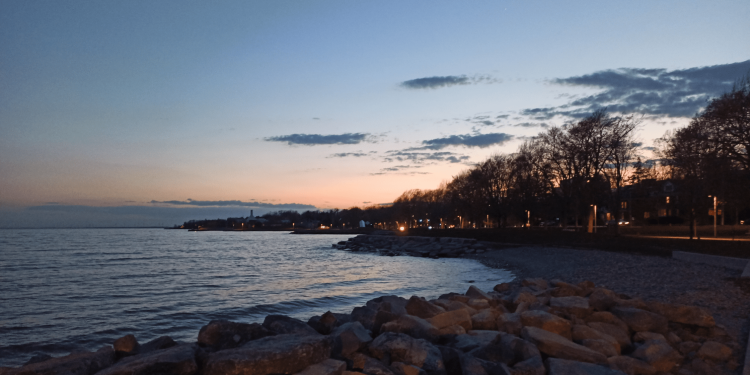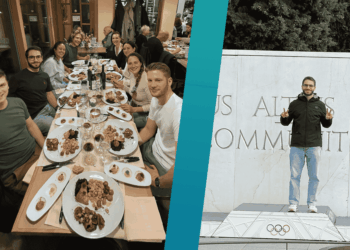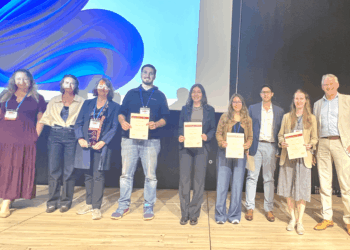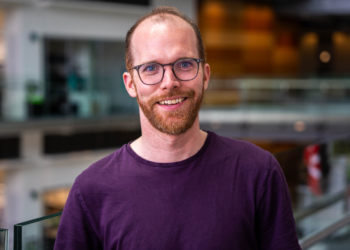Ada Nowosad is a Postdoctoral Researcher at VIB KU Leuven, Center for Cancer Biology, Belgium who received an EACR Travel Fellowship to visit and work at Queen’s University, Kingston, Canada between April and May 2025.
The EACR, with support from Worldwide Cancer Research, provides Travel Fellowships of up to €3,500 to enable early-career cancer researchers to gain new skills through a short-term visit to a lab or research group in another country.
You can read about other Travel Fellows and their experiences here.
 Name: Ada Nowosad
Name: Ada Nowosad
Job title: Postdoctoral Researcher
Home institute: VIB KU Leuven, Center for Cancer Biology, Belgium
Host institute: Queen’s University, Kingston, Canada
Dates of visit: 14 April – 13 May 2025
Research: Melanomas are composed of both malignant cancer cells and formerly normal stromal cells. These stromal cells may influence cancer cells indirectly by secreting factors that promote tumour growth, or directly by contributing to the formation of blood vessels that supply nutrients and oxygen to the tumour. My research focuses on dissecting the interactions between melanoma cells and stromal cells, with the goal of identifying druggable targets that disrupt these cell-cell communication networks. Gaining a deeper understanding of the complex interactions within the tumour ecosystem is essential for developing innovative therapeutic strategies, particularly for tumours that are resistant to current treatments.
Why did you decide to apply for an EACR Travel Fellowship?
While working on cell-cell communication within the tumour microenvironment, I became interested in studying tumour-infiltrating nerves and their secreted factors. This required me to deepen my understanding of neurobiology and acquire new technical skills to advance my project. The EACR Travel Fellowship offered a valuable opportunity to fund my visit to Prof. Talbot’s lab in Kingston, Canada, for one month.
Why did you choose the host lab?
I took advantage of an existing collaboration between Prof. Talbot and my supervisor on a project related to melanoma innervation, which made his lab a natural choice for my visit.
“I gained new skills and knowledge, and I met amazing people with whom I hope to stay connected”
Can you summarise the research you did or what you learned on your visit?
I learned several techniques related to neuron isolation from dorsal root ganglia, including their processing for staining, flow cytometry, culture, and functional assays such as calcium imaging. With the support of the team, we also conducted in vivo experiments using a reporter mouse model that enables tracing of melanoma-innervating nerves. These experiences significantly expanded my technical skill set and deepened my understanding of neurobiology in the context of cancer research.
Describe a ‘typical day’ on your visit.
I primarily worked with Dr Anais Roger, a talented postdoc, and Alissa Dory, a promising PhD candidate in bioengineering. Our work was supervised by Prof. Sébastien Talbot, who regularly provided feedback and guidance. Each day began with planning discussions to organise our experiments. Anais often demonstrated techniques such as neuron isolation or embedding, after which Alissa and I practiced them in parallel to improve our skills. Throughout the day, we exchanged ideas—both scientific and personal—making the lab environment collaborative and enjoyable.
What were you able to do that you could not have achieved in your home lab?
My home lab lacks expertise in peripheral innervation, which made this aspect of my project challenging. Being immersed in a neurobiology-focused environment allowed me to refine my project direction and gain the technical skills necessary to investigate tumour-infiltrating nerves effectively.
Did you take part in any interesting local activities?
During my stay, I visited Montreal and Toronto in addition to Kingston, where the lab is located. I especially enjoyed watching sunsets over Lake Ontario, as my apartment was right by the beach.

What was a personal highlight of your trip?
I truly appreciated the welcoming and supportive atmosphere in the lab. The team was always open and helpful, and we shared many laughs—especially during long evenings when experiments ran late.
Was the host institution very different from your own?
The host institution focuses on neuro-immunology, while my home institute specialises in cancer research. The organisation of the animal facility and access to equipment differed significantly, requiring more supervision than I’m used to. However, with a longer stay, I believe I could have worked more independently.
Did you have a personal mentor or anyone who particularly helped you?
Dr Anais Roger was instrumental in making my stay productive and enjoyable. As the most experienced neurobiologist in the lab, she taught me the most. She also helped me with logistics before my arrival, picked me up on my first day, introduced me to the team, and planned our experiments to maximise my learning.
How has the trip inspired you in your research?
I was inspired by the team’s optimism and enthusiasm. The visit gave me a clearer direction for my project, including which models to use and how to approach key research questions.
Have you brought back any specific knowledge or technique that has benefited your home lab?
I’m now sharing the techniques I learned with a PhD candidate in my lab who is also interested in this area of cancer research.
Does your lab plan to do any future collaboration with the host lab?
Our labs are already collaborating on a project involving melanoma-innervating nerves, and I anticipate exciting joint publications in the near future.
How has this visit been beneficial to your research and your career?
This experience has been enriching both professionally and personally. I gained new skills and knowledge, and I met amazing people with whom I hope to stay connected.
Is there anything else you’d like to mention?
I would like to express my sincere gratitude to the EACR for awarding me this fellowship, to Prof. Sébastien Talbot for hosting me, and to all the lab members—Anais, Alissa, Tuany, Surbhi, Vishvaja, and Tianhui—for making my stay in Canada unforgettable. I’m also thankful to my supervisor for encouraging me to step out of my comfort zone and explore new scientific directions.
Want to find out more?
If you are interested in applying for the Travel Fellowship scheme, please click here for more information: EACR Travel Fellowships.










